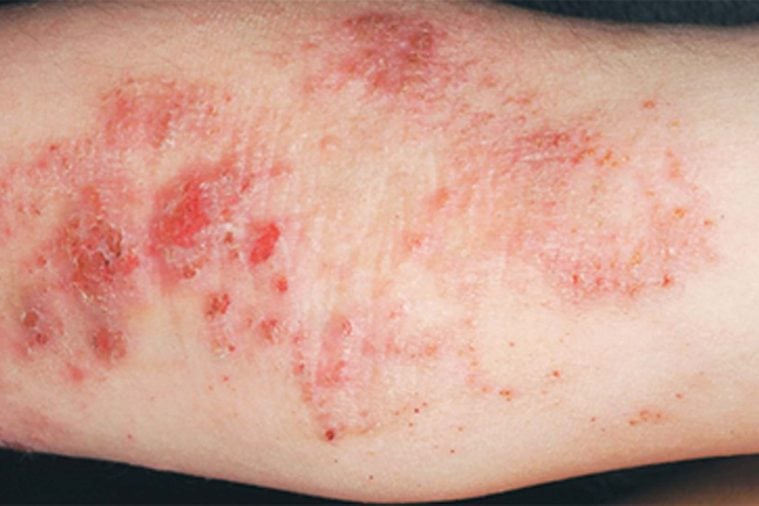This Is What It’s Really Like to Live with Severe Eczema
Updated: Nov. 03, 2017
Meet Peter Moffat, award-winning writer and the executive producer of HBO's "The Night Of," and a lifelong atopic dermatitis patient who is determined to tell the world about this painful inflammatory disease for which there is no cure.
Eczema is not just dry skin
 Peter Moffat, award-winning writer and the executive producer of HBO’s The Night Of, knows a lot about what life is like for one of the integral characters in the UK series—lawyer John Stone (played by John Turturro), who suffers from severe eczema, also known as atopic dermatitis (AD). In fact, Moffat was diagnosed with eczema when he was just 5 years old, and he based Stone’s experience on what it has been like living with the disease for most of his life.
Peter Moffat, award-winning writer and the executive producer of HBO’s The Night Of, knows a lot about what life is like for one of the integral characters in the UK series—lawyer John Stone (played by John Turturro), who suffers from severe eczema, also known as atopic dermatitis (AD). In fact, Moffat was diagnosed with eczema when he was just 5 years old, and he based Stone’s experience on what it has been like living with the disease for most of his life.
“The doctor that my mother and I saw when I was a child looked like Sean Connery,” he says. “We thought, ‘oh good he looks like Sean Connery so he will be right about everything.’ He told us I had infantile eczema and told us it would go away. Fifty years later, it’s showing no signs of disappearing.”
To draw attention to this chronic inflammatory skin disease, Moffat has launched a new project called Understand AD, which features a new short that he wrote, directed, and produced, that gives viewers an inside look at the physical and psychological impact of moderate-to-severe eczema, which affects 1.6 million Americans and can cause everything from sleeplessness to feelings of anxiety, depression, and isolation. October is National Eczema Awareness Month and Moffat is determined to use his platform to shed light on a chronic disease that many often brush off as “dry skin,” even though eczema does involve excessive dryness.
Eczema gets the spotlight
A big part of The Night Of involves John Stone’s character doing his very best to manage his eczema. “In all eight hours, his skin disease writes across the show,” Moffat says. “There’s the scratching at night, the desperate search for remedies, the hardship, the hope. I think we got a three-dimensional character out of a skin disease!” Here’s what you need to know about eczema, especially if you have it.
Viewers take notice
When the show aired, Moffat received lots of feedback about the show’s spotlight on AD. “People said that AD was like a character all of its own, that there was New York City and there was AD,” he says. Viewers were especially moved by the portrayal of the disease, which hasn’t gotten its moment in prime time up until now. “One really memorable Tweet called The Night Of the story of a guy with eczema with a murder subplot,” Moffat says. “I loved that.”
What is atopic dermatitis?
 Moffat—and the John Stone character on The Night Of—suffer from Atopic Dermatitis, the most common form of eczema, a chronic, inflammatory skin disease characterized by unpredictable flare-ups driven in part by a malfunction in the immune system. Despite common misconceptions that AD is “just” a skin condition, it is a systemic inflammatory disease that can have a significant physical and psychological impact on people with the condition. Is it AD or something else? These are the signs of eczema to never ignore.
Moffat—and the John Stone character on The Night Of—suffer from Atopic Dermatitis, the most common form of eczema, a chronic, inflammatory skin disease characterized by unpredictable flare-ups driven in part by a malfunction in the immune system. Despite common misconceptions that AD is “just” a skin condition, it is a systemic inflammatory disease that can have a significant physical and psychological impact on people with the condition. Is it AD or something else? These are the signs of eczema to never ignore.
Surprise! AD isn’t contagious
While rashy skin and blistering may seem to the casual onlooker like it might be contagious, it absolutely isn’t. “I get people moving away from me on the London underground because I wear flip flops or sandals (it’s better to air your feet),” he says. “My feet do look a bit grim but I think parents have their kids move away from me because they think their kid is going to catch my AD. If there’s any one single thing that this new program can do is to tell people that no one can catch AD from anyone.”
Remedies are elusive
Just like Turturro’s character struggles week after week as he tries extreme remedies to alleviate the pain and itching from his AD—from wrapping his body in Crisco to applying topical creams, UV light therapy, and drinking exotic herbal teas—so is it true for anyone experiencing AD. “Currently there is such conflicting opinion about what to do to help,” Moffat says. “Some people say it’s important to keep the skin moist, but I’m not sure. Certainly hydrocortisone ointments, Chinese medicine, all the stuff Turturro’s character tries can help—I’ve wrapped parts of my body in Crisco and it does help—but on the whole, in my case, most remedies have been unsuccessful.” Here are home remedies for eczema worth trying, including this potential miracle trick to relieve eczema itching.
Atopic dermatitis may run in families
If you have family members who have asthma and hay fever, you may experience AD, Moffat says. “A lot of family members have this trio of ailments but I don’t have this in my family,” he says. “I don’t think we know why AD occurs but we do know that it’s a malfunction in the immune system.” Don’t miss the things your mother’s health can reveal about your body.
There’s more to AD than just physical pain
For those with AD, the psychological aspect of the condition can be debilitating. “People suffer from anxiety and depression, and lots of people have had to give up a job because they were expected to be in the public domain,” Moffat says. “For example, if you have AD on your face and you can’t have people walking away from you during a business meeting, the stigma is really big.” AD can lead to social isolation too. “Imagine you’re on a third date and things are going well,” Moffat says. “What’s your worry? That the girl you fancy is going to see the backs of your knees or your feet or the bottom of your back and be disgusted.” These are the biggest relationship dealbreakers, according to science.
An educational plan
Moffat hopes that his new project, produced in partnership with Regeneron, Sanofi, and the National Eczema Association, will build AD awareness and help educate the public about the disease. The site includes a documentary short that allows viewers to peek inside a “day in the life” of a person living with controlled moderate-to-severe atopic dermatitis. “Once in a lifetime you get a real opportunity to build a platform from which you can talk about something people haven’t talked about before,” Moffat says. “This is that moment.” And the site also offers a place for those with AD to turn for information. “If we can educate people to understand this disease than the people suffering from it will be empowered to speak about it,” Moffat says.
Hoping for understanding—and kindness
In the end, Moffat hopes that, in the future, no one will ever mock, poke fun of, or isolate someone with AD. “I like to think about this disease in that way,” he says. “I think that one day nobody will stare at my feet on the London subway. I believe that will happen.”
Learn more about what common diseases your skin can reveal.
